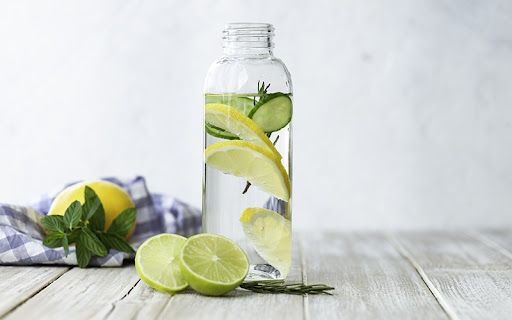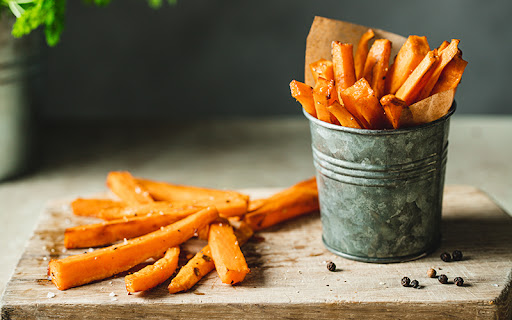We all know that getting enough physical activity and making nutritious diet choices are key factors in helping us stay healthy. However, as we get older, our nutritional needs shift,, and keeping our body in good shape can be hard. Being aware of your aging body’s needs will help you age well and stay active throughout your golden years.
Some healthy food choices remain the same, regardless of age: eat fruits and vegetables, stay hydrated, cut down on red meat, use healthy fats instead of saturated, et cetera. After you turn 60, there are additional factors you should take into consideration to reduce your risk of heart disease, chronic illness, and overall unhealthiness.
Here are seven food groups that older adults should avoid when possible, as well as suggestions for healthier food choices to help meet nutritional needs and have an enjoyable eating experience.
7 Foods To Avoid After 60 (And What To Eat Instead)
1. Empty calories
Empty calories come from foods with little to no nutritional value, like potato chips, candy, full-sugar sodas, cakes and cookies, and other “junk” foods. Since your metabolism slows as you age, older adults need to be particularly mindful of what empty calories they are ingesting and how they can make better food choices.
Instead of:
- Juice drinks
- Sugary cereal
- Ice cream
- Potato chips
Choose:
- Infused waters
- Steel-cut oatmeal with fruit
- Frozen fruit dipped in dark chocolate
- Baked kale chips

2. Raw or unpasteurized foods
Older foodies who enjoy sushi, rare hamburgers, and unpasteurized milk and dairy products should be cautious with their dining choices after age 60. Seniors have a less effective immune system, which means they’re at an increased risk of developing a foodborne illness like listeria – which is the third leading cause of food poisoning-related deaths in the United States. When dining, older adults should choose food items heated to an internal temperature of at least 165°F.
Instead of:
- Sashimi
- Soft cheese like Brie
- Undercooked eggs (sunny-side up)
- Raw sprouts
Choose these:
- Sushi with cooked fish
- Hard cheeses like Cheddar
- Fully cooked eggs (omelet)
- Microgreens
3. Grapefruit
You wouldn’t think that the humble grapefruit, which is filled with vitamin C and potassium, would be a food to avoid. However, if you’ve looked at your medicine bottles lately, you may have seen several with the warning to avoid grapefruit juice. That’s because many medications are metabolized by an enzyme called CYP3A4 – and grapefruit juice can block that action, which means that too much of a drug can enter your body.
Instead of:
- Grapefruit juice
Choose:
- Orange juice
- Tomato juice
- Cranberry juice
4. Fried foods
As delicious as a sizzling basket of onion rings or a warm, sugary donut can be, they’re also filled with saturated fat, unhealthy oils, and a lot of empty calories. While these foods are okay as a once-in-a-while treat, choosing healthier sides that provide vital nutrients like vitamin b12, calcium, and others is best.
Instead of:
- French fries
- Fried chicken
- Donuts
Choose:
- Baked sweet potato fries
- Grilled chicken
- One donut hole + fresh berries

5. Caffeine
While caffeine provides a much-needed morning jolt for many younger adults, seniors may find themselves reacting differently to caffeine as they age. It’s not uncommon for many coffee aficionados to suddenly find themselves with jitters, increased anxiety, and a higher heart rate. These side effects are not just unpleasant but potentially dangerous if you have a heart condition. While switching caffeinated drinking options for decaf is a great solution, be sure to check labels when purchasing food and even medications, as caffeine can be a stealth ingredient.
6. High-sodium foods
Eating foods high in sodium can cause fluid retention, which can result in hypertension – a leading cause of strokes, kidney disease, and heart issues. While sodium is found in many foods (both naturally and added), making it hard to eat a low-sodium diet, it’s important to note that potassium-rich foods can help mitigate the effects of high sodium. Opt for a mix of low-sodium and high-potassium options to reduce your risk of health issues.
Instead of:
- Processed American cheese
- Lunch meats
Choose:
- Low-fat cheddar or Swiss
- Unprocessed options like a chicken breast Potato chips A side salad
7. Alcohol
Much like caffeine, alcohol can affect older individuals much differently than younger adults. Alcohol affects sleep quality, can cause hypoglycemia, raises blood pressure, and increases your risk of liver and kidney issues. Alcohol can also interfere with some medications. Speak with your doctor about how your medicines may be impacted by alcohol, and follow the latest US Dietary Guidelines when imbibing (two drinks or less a day for men, one drink or less a day for women).
Live Deliciously at East Ridge at Cutler Bay
If health and wellness matter in your retirement, we invite you to experience the worry-free lifestyle at East Ridge at Cutler Bay. Not only do we offer exceptional dining options, we also offer a full continuum of care for older adults featuring independent living, assisted living, memory support, other health services, and the promise of LifeCare.
If you’d like to learn more about how we help seniors live a healthy, well-rounded lifestyle, call 305-290-2346 or visit our website today to schedule a tour, complete with a delicious and nutritious lunch.


